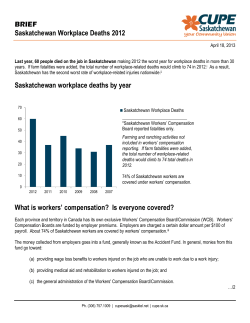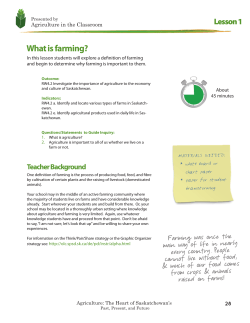
explore PotashCorp 25 In your backyard
explore Fall 2014 PotashCorp In your backyard The Next 25 November 2 marks an important milestone for PotashCorp: 25 years as a publicly traded company. But as we pass this historic date, we’re doing more than looking back; we’re looking ahead. In our operations and in our communities, we’re preparing for a future that will see us play a bigger role in the global food story and continue to help build the places we work and live. This year, we introduced new leadership, including the appointments of Jochen Tilk as CEO and Mark Fracchia as President of our potash operations. We are also nearing the end of our $8.3 billion investment in our potash operations in Saskatchewan and New Brunswick, and we are ready to meet the world’s potash needs for decades to come. As we look forward, we want our communities to grow alongside us. Through our support for initiatives such as PotashCorp Playland at Kinsmen Park and upcoming We Days, we’re providing opportunities for young people to explore their futures too. It’s an exciting time – not only to reflect on what has been accomplished, but also to consider what is yet to come. Learn more about our company’s initiatives and partnerships inside. With the world’s population expected to add close to 2 billion people in the next 35 years, demand for food and potash is expected to grow. PotashCorp is ready. New Brunswick employee Ora Kilpatrick checking a potash sample. Picadilly site expansion in New Brunswick Two new mine shafts, a new mine and mill add to our logistical flexibility There is no shortage of activity at our New Brunswick potash operation. While much of our above-ground expansion is completed, expansion efforts remain full steam ahead some 900 metres below the Earth’s surface. When complete, the cost of New Brunswick site expansions will total $2.2 billion. Development work on our new Picadilly mine, which is located across from PotashCorp’s existing Penobsquis mine, continues as we get ready to hoist the first ore in late fall 2014. Once the new operation is fully online, it will replace production from Penobsquis – enhancing the facility’s competitiveness and providing additional capacity to help meet growing customer demand. Penobsquis Our New Brunswick operation and the Port of Saint John are important to PotashCorp’s success. As the only North American producer that can export from both Canadian coasts, we are positioned to serve our existing customers in places such as Brazil, the US and the Caribbean. We are also in a good location to serve future growth markets such as Africa. Buildings and equipment are not the only things that are new at our New Brunswick site. In mid-June 2014, Jean-Guy Leclair became the site’s new General Manager, bringing his vast experience leading operations at other PotashCorp mine sites. Jean-Guy joined PotashCorp in 2009 as General Superintendent at our Lanigan site and most recently served as General Manager at our Cory site. As a mining engineer, Jean-Guy has worked at a number of Eastern Canada mines, including Caribou and Restigouche in New Brunswick and Raglan in Quebec. “The success of our expansion is our people. This achievement would not have been possible without our own employees, thousands of contractors and many suppliers,” said Jean-Guy. Speaking about his return to New Brunswick after growing up in the province, he added “You always have to appreciate when you can come back home. It is a priceless opportunity to be close to our family.” Picadilly Rocanville site expansion in Saskatchewan First new potash shaft-sinking in the province in more than 30 years A large potash operation is about to get even larger. In fact, the expansion efforts at our Rocanville site (located in southeast Saskatchewan) are expected to more than double current capacity and make it the largest potash mine in the world. When it’s done, the cost of the Rocanville site expansion will total $2.8 billion. At the main site, results of the work that began in 2008 are evident everywhere – a new mill, new warehouses and loadout facility upgrades. New loadout facility at Rocanville “In terms of the benefit of the expansion to local communities, having the distributable incomes of more than 1,000 extra people at the project’s peak assisted the growth of many businesses, hotels and the like in our area,” said Iain Guille, General Manager at Rocanville. “Although these contractor contributions will be missed, our long-term full-time employment opportunities will grow by around 300 employees overall. The completed project will result in Rocanville cementing its global position as a bestin-class operation and, thereby, enhancing job security for many years to come,” added Iain. Another 16 kilometres away, crews have been working since 2010 on the Scissors Creek shaft-sinking project. When complete, the new mine shaft will reach a depth of nearly 1,000 metres and connect underground to Rocanville’s two existing shafts. The new Scissors Creek shaft will become the primary way to transport people and materials underground. This change will reduce employees’ underground travel time, increase the number of production hoists from one to two, and increase potash ore supply to the expanded surface mill. Rocanville’s low-cost operation will play a key role in maintaining PotashCorp’s position as one of the most competitive and reliable potash producers in the world. Scissors Creek Free The Children Engaging and educating program update youth across Canada We Day Saskatchewan, Fall 2013 There are now 7 billion people on Earth and that number is expected to grow to 9 billion by the time the youth of today turn 50. Food security will be one of the biggest challenges faced by the millennial generation. It is for this reason that PotashCorp’s partnership with the international charity Free The Children always keeps youth initiatives top-of-mind. “After the India trip, my perception of food security has expanded. I was educated about local food security concerns such as sustainable food sources before, but I now have more knowledge about how this issue affects people on a global level. I learned about deep concerns such as being able to access nutritious, if any, food. Learning about international concerns definitely fuels my passion, and I’m discovering new ways to make a difference.” – MacKenzie Cook, Guysborough, Nova Scotia This includes founding an Agriculture and Food Security pillar to add to Free The Children’s existing Adopt a Village development model in 2012. This fifth pillar, developed with the financial support of PotashCorp, helps lift rural communities in developing countries out of poverty through education and sustainable programming. PotashCorp is also directly helping farmers in six rural communities in Kenya, India and China to attain the tools and know-how to improve their agricultural productivity, and improve the lives of their youth. Through our partnership, youth at home have more opportunities to delve into the issues of global and local food security. Here are three ways: “The trip to India was an amazing experience that got me motivated to make a change. Learning about the way agriculture is run in India compared to at home in Canada will help me stay passionate and focused. This trip motivated me and gave me confidence to go home and start making a change. Free The Children and PotashCorp made me understand why I volunteer and want to make a difference in the world. Overall, an amazing trip.” – Sara Copeland, Saskatoon, Saskatchewan (We Day ballot winner) India Trip – Summer 2014 1 We Day, Free The Children’s youth empowerment event, takes place in major markets across the country. Our support included bringing two We Days to Saskatchewan in 2013. PotashCorp has been able to reach 119,000 students at We Days this year alone as a National presenting level sponsor and Regional title sponsor of We Day Saskatchewan. 2 Supplemental educational curriculum and a national speaking tour around the issue of food security at the elementary and secondary school levels. These resources help Canadian educators motivate youth to think about creative solutions to current challenges. In five provinces across Canada, the speaking tour has inspired more than 30,500 students in total since the beginning of our partnership. 3 25 youth volunteer trips annually to overseas communities with new agriculture initiatives underway. This year the youth went to India and, in 2015, they will visit Kenya. 25 PotashCorp employee volunteers are also selected to go each year. We Day Saskatchewan November 7, 2014 in Saskatoon We Day Atlantic Canada November 28, 2014 in Halifax In the four communities in rural China and Kenya supported by PotashCorp, 92.5 percent of survey respondents said their family’s health had improved over the past year. The communities also became more self-sufficient with 85 percent of all survey respondents increasing their income. Meet Jochen Tilk Q&A with our new President and CEO Our company’s first 25 years saw only two CEOs. As we now look ahead to the next quarter century, we are pleased to welcome our new President and CEO Jochen Tilk. Jochen joined PotashCorp on July 1, 2014 with a 30year track record in international mining and is known for his focus on operational excellence, including an uncompromising commitment to safety. Jochen’s leadership in building world-class operations is well known. While born in Germany, he has spent a significant portion of his career in Canada and has worked in places as diverse as Brazil, Finland, Panama and Turkey. Jochen Tilk running on the Broadway Bridge in Saskatoon. Tilk with the Saskatoon Tribal Council: Tribal Vice Chief Mark Arcand and Tribal Chief Felix Thomas. Q: Welcome to Saskatoon! How have you settled in so far? Q: What drew you to the CEO role at PotashCorp? JT:It’s exciting to say that we can now officially call Saskatoon home! Denise and I are settling into our new place and learning firsthand how great this city is. JT:PotashCorp, and the fertilizer industry, play such a vital role in human development. The world could not supply half its food requirements without our products. That’s profound and something I wanted to be a part of. As well, PotashCorp has always been a well-run company and a leader in its industry, so it’s great to be on board. Q: What is the first impression of your new community? JT:Love it. While my work and travel schedule kept me busy over the summer, we still saw some great outdoor events and concerts. I’m biased, but I really enjoyed the PotashCorp Fireworks Festival – the crowd’s energy was fantastic. Running is a big part of my work-life balance and I competed in the River Run Classic half marathon in July. Saskatoon’s Meewasin Valley Trail is a perfect place to go running. Q: Y ou’ve had a chance to visit some of PotashCorp’s operations. What are your initial thoughts? JT:I’ve been out to a number of our 17 facilities – visiting most of our potash mines and several of our nitrogen and phosphate operations in the US. It is clear to me that PotashCorp is a company with an unwavering commitment to safety, and that will always be my priority. Our employees are highly engaged and very proud of the company’s record of shared success with local communities. Q: Where do you see the company heading? JT:We see demand growth for our products ahead and are well positioned to respond. As we prepare for this growth, however, it’s important to strike the right balance between operational flexibility and cost. It’s essential that we remain a low-cost delivered supplier to all our key markets. Financial health enables PotashCorp to meet the long-term needs of our customers, investors, employees and communities. Q: H ow do you view your leadership role as PotashCorp moves forward in the next 25 years? JT: The mining industry always has a deep impact on the people and places wherever we operate. For this reason, respect for our people, their safety, our communities and our resources is paramount. As a leader, I strive to have a positive, beneficial impact on all those touched by our business. The fun continues… Proposed opening: Spring 2015 PotashCorp Playland enhances a community treasure The sprawling green space along the South Saskatchewan River known as Kinsmen Park has been a gathering spot and recreation area for Saskatoon families for more than a century. 2015 And with the creation of PotashCorp Playland within it, the 46-acre park will offer even more of a getaway in the heart of the city. “It’s a place everyone in our community can enjoy,” said Rhonda Speiss, PotashCorp’s Manager of Community Investment. “The park embodies what we try to achieve with our community investments: it makes our home community an even better place to live and raise a family.” PotashCorp committed $7.5 million toward the $9.135 million project, facilitating a necessary overhaul that will prepare the space for future generations. “PotashCorp has always been a great corporate and community partner in Saskatoon. The $7.5 million contribution to Kinsmen Park will breathe new life into this iconic park and create a real family entertainment location in this historic downtown neighbourhood,” said Mayor Donald Atchison. 1951 The original train ride through the park was installed in 1951. With the support of Canpotex and CP Rail, a new train and track will circle the park. “Kids love it because it’s fun,” said Rhonda Speiss. “We love it because the rail lines are such an important part of Saskatchewan’s story.“ (Image Credit: City of Saskatoon Archives, #1048-0325) The original park, created in 1903, was Saskatoon’s first and has been home to the Exhibition Grounds and, since 1947, Kinsmen Park. With the investment and upgrades, PotashCorp Playland at Kinsmen Park will build on those traditions and create a community space for generations to come. 2014 PotashCorp’s $7.5 million commitment will help build infrastructure and new amenities in the park, including additional green space and gathering places. As part of PotashCorp Playland, a number of familiar favorites – including the carousel, ferris wheel and train ride – will be upgraded. 25 years of nourishing human potential PotashCorp’s progress is often measured in numbers – such as our growing production capability, the long-term increase in share value or the economic impact we have in our communities. The real magic lies beyond the nutrients we produce After participating in PotashCorp’s engineer-in-training program in Saskatchewan, Steven – a native Maritimer – joined the company in a full-time role in 2011. But the true heart of our performance is found in the people – the ones who keep PotashCorp a leader in our industry and those who proudly discuss the impact “Let’s just say it was a pleasant surprise. we’ve had at home and around the world. I didn’t expect to be in mining and I certainly didn’t think I’d be living and As part of our reflection on 25 years, working in the Maritimes.” we’ve assembled 25 of our favorite stories about the people and communities Mike Anderson, whose lives are intertwined with the CEO, The Andersons, work we do. Maumee, Ohio Here’s a sample of what you’ll find at Over the past 25 years, Mike Anderson PotashCorp.com/25: has worked with PotashCorp to turn his family-owned business into one of the largest fertilizer dealers in the US Midwest. “Our legacy will be defined another 25 years from now, when we’re still working together, and when we’re still friends.” Opt in electronically! PotashCorp.com Gary Lerat, Mine Operator, Rocanville, SK Steven Johnston, Electrical Engineer, Sussex, NB A proud member of Cowessess First Nation, Gary represents the changing face of PotashCorp and Saskatchewan. “‘Cowessess’ literally translates to ‘little boy’ and even though I’ve come back as a man, I still have that childlike love for land and family. And to me, there’s no better feeling in this world.” Jack Danylczuk, Warehouseman, Patience Lake, SK Jack has been part of his site’s emergency response and mine rescue team for 24 years, including the last four as a trainer. In 2013, he was named Emergency Response Person of the Year by the Saskatchewan Mining Association. “It’s been the best part of my career and we’re pretty fortunate PotashCorp supports us.” Selina Kabusia, Mother and Farmer, Sikirar, Kenya In partnership with Free The Children, PotashCorp is teaching communities in Kenya about food production and Selina is getting better yields from her land. “I’m able to source fresh vegetables for cooking at home and this has improved my family’s diet. We will have enough food and won’t be hungry.” To see more videos, photos and stories, visit PotashCorp.com/25 Would you like to receive our next Report to the Community electronically or receive additional printed copies? Please email us at corporate.relations@potashcorp.com. Facebook.com/PotashCorp Twitter.com/PotashCorpSask
© Copyright 2025









